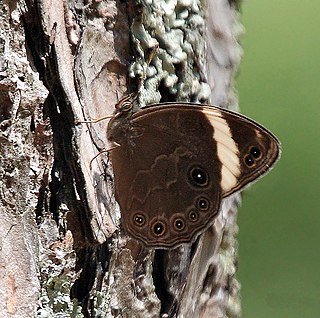
Lethe is a genus of butterflies in the subfamily Satyrinae of the family Nymphalidae. The genus was erected by Jacob Hübner in 1819. It includes the treebrowns, woodbrowns, foresters and their relatives. The species in the genus Lethe occur in temperate-tropical southern and eastern Asia, up to Indonesia and in North America.

Erebiola butleri, or Butler's ringlet, is an elusive New Zealand endemic butterfly, discovered in 1879 by John Enys at the alpine pass at the head of the Rakaia River. It is the only member of the genus Erebiola.

The painted chorus frog, also commonly known as Butler's narrow-mouthed toad, Butler's pigmy frog, Butler's rice frog, Butler's ricefrog, noisy frog or tubercled pygmy frog, is a species of frog in the family Microhylidae. It is found in northeast India, Myanmar, southern China, Hong Kong, Taiwan, Thailand, Cambodia, Laos, Vietnam, Peninsular Malaysia, and Singapore. Its natural habitats are subtropical or tropical moist lowland forest, subtropical or tropical moist montane forest, subtropical or tropical moist shrubland, swamps, intermittent freshwater marshes, arable land, plantations, rural gardens, ponds, open excavations, and irrigated land. It is not considered threatened by the IUCN.

Cyana is a genus of moths in the family Erebidae. Species are well distributed in Africa, Madagascar, China, India, Sri Lanka, Myanmar, Sumatra, Java and Borneo. The genus was erected by Francis Walker in 1854.
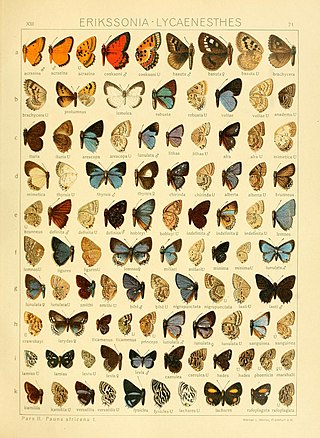
Anthene is a genus of butterflies in the family Lycaenidae, commonly called the ciliate blues or hairtails. The genus was erected by Edward Doubleday in 1847.
The spotted mulga snake, also known commonly as Butler's black snake and Butler's snake, is a species of venomous snake in the family Elapidae. The species is endemic to Western Australia. It is a member of the genus Pseudechis, dangerously venomous snakes that can intimidate an opponent by raising the head and presenting a hood. This cobra-like threat display is supported by the ability to produce a very large amount of venom.

Cidariplura is a genus of moths of the family Erebidae. The genus was erected by Arthur Gardiner Butler in 1879.
Ectogonia is a genus of moths of the family Erebidae. The genus was erected by George Hampson in 1896.
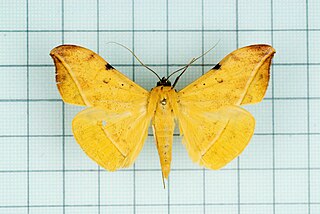
Hamodes is a genus of moths of the family Erebidae. The genus was erected by Achille Guenée in 1852.
Marojala is a genus of moths of the family Erebidae. The genus was described by Viette in 1966. All the species are found on Madagascar.
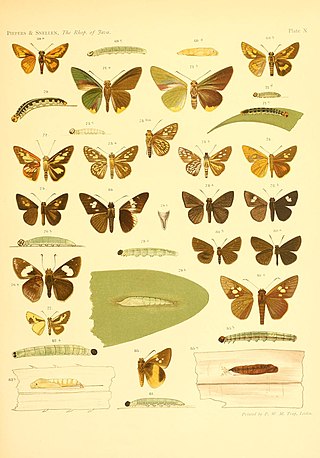
Astictopterus is a genus of grass skippers in the family Hesperiidae. There are two species groups, one Afrotropical, the other Indomalayan.

Anthene butleri, the pale hairtail or Butler's ciliate blue, is a butterfly of the family Lycaenidae. It is found from South Africa to Kenya, Uganda, and Ethiopia. In South Africa it is found in coastal lowland forest in KwaZulu-Natal, from the coast to Kosi Bay, inland across the Makathini Flats.
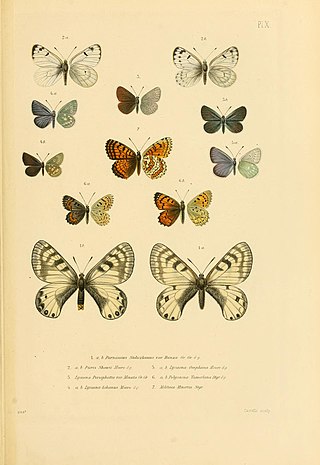
Baltia is a Palearctic genus of butterflies in the family Pieridae. The genus was erected by Frederic Moore in 1878. The three species are found in the Himalayas.

Taenaris is a genus of butterflies in the family Nymphalidae, subfamily Amathusiinae, that distributed throughout Australasia with a majority of species being located on the island of New Guinea. They are commonly known as the owl butterflies.

The Omani owl is an owl of the genus Strix found in shrubland and rocky areas of Oman, Iran and the United Arab Emirates. It was discovered in 2013.
Sinibotys butleri is a snout moth in the subfamily Pyraustinae in the family Crambidae. It was described in the genus Crocidophora by Richard South in 1901 based on a single female imago collected in Ningbo in China's Zhejiang province. The species is sexually dimorphic, with females exhibiting shorter, less pointed forewings than the males. The imagines and genitalia of the species are illustrated in Lee et al. (2018).

Thambotricha is a monotypic genus of moths in the family Epermeniidae. Its sole known species, Thambotricha vates, is also known by the vernacular name wonder-haired prophet. It is endemic to New Zealand. This species is classified as "At Risk, Naturally Uncommon" by the Department of Conservation.
Eoperipatus butleri is a Malaysian species of velvet worm in the Peripatidae family.

Delma butleri, also known commonly as Butler's legless lizard, Butler's scalyfoot, the spinifex snake-lizard, and the unbanded delma, is a species of lizard in the family Pygopodidae. The species is endemic to Australia.
Morethia butleri, also known commonly as Butler's Morethia and the woodland Morethia skink, is a species of lizard in the family Scincidae. The species is endemic to Australia.












